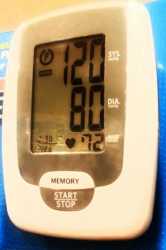
05 Nov Elevated Blood Pressure At Night Linked to Increased Risk of Heart Disease
MedicalResearch.com Interview with:
Kazuomi Kario, MD, PhD, FACP, FACC, FAHA, FESC, FJCS
Professor, Chairman
Division of Cardiovascular Medicine, Department of Medicine,
Jichi Medical University School of Medicine (JMU)
JMU Center of Excellence, Cardiovascular Research and Development (JCARD)
Hypertension Cardiovascular Outcome Prevention and Evidence in Asia (HOPE Asia) Network
Shimotsuke, Tochigi, 329-0498, JAPAN
MedicalResearch.com: What is the background for this study?
Response: To date, it remains unclear whether disrupted blood pressure (BP) circadian rhythm is associated with adverse outcomes independent of nighttime BP.
The JAMP study includes 6359 outpatient population who had ambulatory BP monitoring to evaluate the association between both nocturnal hypertension and nighttime BP dipping patterns and the occurrence of cardiovascular events in patients with hypertension.
MedicalResearch.com: What are the main findings?
Response: This largest prospective ABPM study to date showed that nighttime blood pressure and a riser pattern of nighttime blood pressure were significantly and independently associated with the risk of Atherosclerotic Cardiovascular Disease and Heart Failure events.
MedicalResearch.com: What should readers take away from your report?
Response: The earlier and the lower blood pressure control throughout a 24-hour period including nighttime is important for reducing cardiovascular events especially for the high-risk patients. Earlier detection and management of nocturnal hypertension will contribute to reduce the risk of Atherosclerotic Cardiovascular Disease and Heart Failure events.
MedicalResearch.com: What recommendations do you have for future research as a result of this work?
Response: An intervention study to reduce nighttime blood pressure level <120 mmHg.
MedicalResearch.com: Is there anything else you would like to add?
Response: This study was financially supported in part by a grant from the Foundation for the
Development of the Community (Tochigi).
Disclosures:
Kazuomi Kario has received research funding from Omron Healthcare Co., Fukuda Denshi, and A&D Co. None of the other authors have any conflicts of interest to disclose.
Citation:
Nighttime Blood Pressure Phenotype and Cardiovascular Prognosis: Practitioner-Based Nationwide JAMP Study
Kazuomi Kario , Satoshi Hoshide , Hiroyuki Mizuno , Tomoyuki Kabutoya , Masafumi Nishizawa , Tetsuro Yoshida , Hideyasu Abe , Tomohiro Katsuya , Yumiko Fujita , Osamu Okazaki , Yuichiro Yano , Naoko Tomitani , and Hiroshi Kanegae On behalf of the JAMP Study Group
Originally published2 Nov 2020https://doi.org/10.1161/CIRCULATIONAHA.120.049730Circulation. ;0
JOIN OUR EMAIL LIST
[mailpoet_form id="5"]We respect your privacy and will never share your details.
Last Modified: [last-modified]
The information on MedicalResearch.com is provided for educational purposes only, and is in no way intended to diagnose, cure, or treat any medical or other condition. Always seek the advice of your physician or other qualified health and ask your doctor any questions you may have regarding a medical condition. In addition to all other limitations and disclaimers in this agreement, service provider and its third party providers disclaim any liability or loss in connection with the content provided on this website.
Last Updated on November 5, 2020 by Marie Benz MD FAAD
